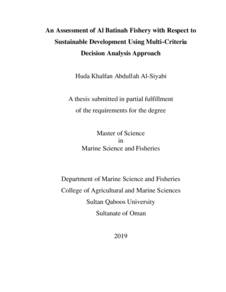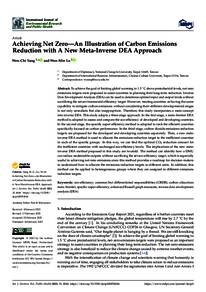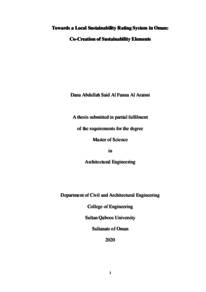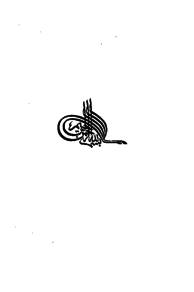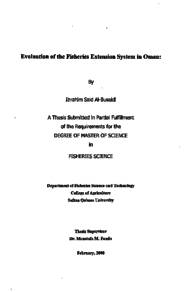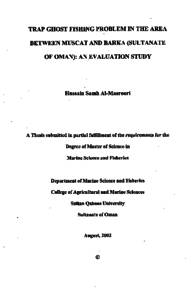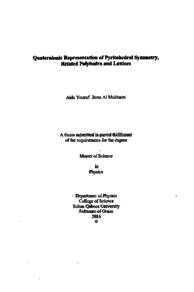Document
An Assessment of Al Batinah Fishery with Respect to Sustainable Development Using Multi-Criteria Decision Analysis Approach
Publisher
Sultan Qaboos University
Gregorian
2019
Language
English
English abstract
Globally, sustainable development is considered as a vital need to fisheries sector that integrated human well-being (socio-economic development) and environmental well-being (conservation). The Sultanate of Oman recognised the importance of this issue and started to promote the fishery management system by establishing new fisheries development plans and lots of management policies to achieve the sustainable development goals. However, there was no assessment carried out to see whether the sustainable development goals were fulfilled or not and at what level especially in the artisanal sector. Therefore, this study aimed at assessing the progress of Al Batinah fishery towards sustainable development using Ecologically Sustainable Development (ESD) framework and Multi-Criteria Decision Analysis approach (MCDA). Al Batinah Governorate was selected due to the availability of data compared to other governorates and for its high contribution to the artisanal fishery landing. A consultation review was conducted involving different kinds of stakeholders to identify all possible components (criteria) of the ESD framework (food, income, employment, primary commercial species, other aspects etc). In addition, objectives, indicators (per capita fish consumption, landing, abundance of target species etc), reference points and data along with their trends from 2008 to 2017 were also identified and/or gathered for each single component of the framework. MCDA was used to deal with the different kinds of qualitative and quantitative indicators. Progress of each component toward sustainability and sensitivity analysis were conducted in order to identify strengths and weaknesses of components. Attainment toward sustainability in Al Batinah fishery progressed showed a positive trend. Scores increased from 50 points (on 100 points scale) in year 2009 to 81 points in year 2016. Specifically, the progress toward sustainability in the human well-being was better. The scores increased from 55 points in year 2009 to 95 points in year 2016 indicating excellent progress. However, the progress toward sustainability in the environmental well-being was minimal. The scores increased from 42 points in year 2008 to only 67 points in the last three years (2015-2017) indicating a slow and a below average progress. The results indicated that the year (2016) had the best attainment toward sustainability and the management measures and/or practices adopted in 2016 favoured socio-economic development more than conserving the environment. Sensitivity analysis confirmed that year 2016 was the most preferred year and provided different strengths and weaknesses to improve both human and environmental well-beings and consequently improving the progress toward sustainability. The management authority is therefore advised to adapt conservative measures to promote and protect the environment. In the long-term, such preferences of human well-being over environment might threaten the whole fishery
Description
Thesis
Member of
Resource URL
Arabic abstract
عالميا، تعتبر التنمية المستدامة حاجة ملحة لقطاع مصائد الأسماك حيث تجمع بين رفاهية الإنسان (التنمية الاجتماعية والاقتصادية والرفاه البيئي (صون البيئة). أدركت سلطنة عمان أهمية هذه القضية وبدأت في تعزيز نظام إدارة المصائد من خلال وضع خطط جديدة لتطوير مصائد الأسماك والكثير من سياسات الإدارة لتحقيق أهداف التنمية المستدامة، مع ذلك لم يتم إجراء تقييم لمعرفة ما إذا كانت أهداف التنمية المستدامة قد تحققت أم لا، وإلى أي مستوى لا سيما في القطاع الحرفي، لذلك، تهدف هذه الدراسة إلى تقييم تقدم مصائد الباطنة نحو التنمية المستدامة باستخدام إطار التنمية المستدامة بيئية ونهج تحليل القرار متعدد المعايير. وقد تم إختيار محافظة الباطنة بسبب توفر البيانات ولمساهمتها المرتفعة في الإنزال السمكي للمصائد التقليدية. تم إجراء مراجعة استشارية شملت عدة أصناف من أصحاب المصلحة لتحديد جميع المكونات المعايير الممكنة لإطار عمل البيئة والتنمية المستدامة (الغذاء ، الدخل ، التوظيف ، أنواع الأسماك التجارية الأولية ، الجوانب الأخرى إلخ) إضافة إلى ذلك، تم تحديد و / أو جمع الأهداف والمؤشرات (نصيب الفرد من استهلاك الأسماك، الإنزال ، وفرة الأنواع المستهدفة إلخ) ، والنقاط المرجعية والبيانات جنبا إلى جنب مع اتجاهها لكل عنصر من عناصر الإطار، تم استخدام نهج تحليل القرار متعدد المعايير للتعامل مع أنواع مختلفة من المؤشرات النوعية والكمية، كما تم استخدام برنامج Hiview لتقييم تقدم كل مكون نحو الاستدامة وإجراء تحليل الحساسية من أجل تحديد نقاط القوة والضعف للمكونات. بشكل عام، أظهرت النتائج أن تحقيق الاستدامة في مصايد الباطنة قد تقدم في اتجاه إيجابي مع الوقت، فقد ارتفعت درجاتها من 50 نقطةعلى مقياس 100 نقطة في عام 2009 إلى 81 نقطة في عام 2016، تحديدا، كان التقدم نحو الاستدامة في رفاهية الإنسان أفضل حيث ارتفعت النقاط من 55 نقطة في عام 2009 إلى 95 نقطة في عام 2016 مما يشير إلى تقدم ممتاز. ولكن التقدم نحو الاستدامة في الرفاه البيئي لم يكن جيدة كفاية حيث ارتفعت النقاط من 42 نقطة في عام 2008 إلى 67 نقطة فقط في السنوات الثلاث الأخيرة (2015-2017) مما يشير إلى تقدم بطيء وأقل من المتوسط أشارت النتائج إلى أن العام (2016) كان الأفضل في التقدم نحو الاستدامة وأن السياسات و / أو الممارسات الإدارية المعتمدة في عام 2016 كانت تفضل التنمية الاجتماعية والاقتصادية أكثر من الحفاظ على البيئة أكد تحليل الحساسية أن عام 2016 كان العام الأكثر تفضيلا وقدم نقاط قوة ونقاط ضعف مختلفة لتحسين الرفاه البشري والبيئي وبالتالي تحسين التقدم نحو الاستدامة على المدى الطويل، هذ التفضيل لرفاهية الإنسان على البيئة قد يهدد البيئة السمكية بأكملها، لذلك فإن السلطة الإدارية مطالبة بتكييف التدابير لتعزيز وحماية البيئة
Category
Theses and Dissertations

